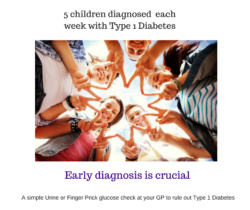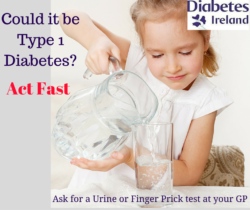The Department of Paediatrics in Birmingham last week released the results of a study1 that align with anecdotal information in Ireland that 1 in 3 children attending their GP with onset Type 1 diabetes are not being referred to hospital promptly resulting in 50% of children newly diagnosed with Type 1 diabetes having diabetic ketoacidosis (DKA), potentially a life threatening condition.
The Birmingham research team surveyed 300 GP’s on how timely they had referred a young person they suspected of Type 1 diabetes to a specialist diabetes paediatric team. The research team also looked back over 9 years of case notes of children diagnosed with Type 1 diabetes from January 2005 to December 2015 to uncover the incidence of DKA.
Of the 111 (37%) GP’s who replied to the survey, 73 did a prompt referral (65.8%) leaving 38 (34.2%) children with a delayed referral. To understand the implications of a delay in referral, the old case notes provided valuable information.
The case note review showed 96 children were diagnosed with Type 1 and 35 of these (36.5%) had a delayed referral. The average delay of 2 days led to 19 children (54.3%) presenting with DKA.

Dr Declan Cody, Consultant Paediatric Endocrinologist, Our Lady’s Children’s Hospital, Crumlin commented “‘this study again demonstrates the importance of the awareness and early recognition of the symptoms of Type 1 diabetes in children and adolescents. Delay in diagnosis and lack of prompt referral can result in diabetic ketoacidosis (DKA) which is a potential life-threatening complication of this condition”.
The most common reason for the delay was the GP attempting to confirm the diagnosis by undertaking further tests such as a fasting blood glucose test or oral glucose tolerance test. Dr Anna Clarke, Diabetes Ireland commented “This report mirrors what we are hearing from parents in Ireland. GP’s ask parents to bring their child back the next day or in a few days if they are not better for blood tests, whereas an immediate urine or finger prick glucose check is warranted”.

In 2014, 1 in 6 children in Ireland admitted to hospital had DKA. DKA is completely avoidable with early diagnosis. Diabetes Ireland is currently targeting GP’s, Schools, Parent Groups, Crèches and Pharmacies to increase awareness of the differences between Type 1 and Type 2 diabetes and the urgency in confirming Type 1 diabetes and treating it early.
The National Institute for Health and Care Excellence (NICE) issued guidelines in 2004 “children and young adults with suspected Type 1 diabetes should be offered immediate (same day) referral to a multi-disciplinary paediatric diabetes care team that has the competencies needed to confirm diagnosis and to provide immediate care”

REFERENCES
1. Dhaara Iyer et al. (2016) Timeliness of referral of children with new onset type 1 diabetes. Postgrad Med J; Published Online First August 5 2016.
-END-
Editors Notes
The prevalence of Type 1 Diabetes in Ireland
People with Type 1 diabetes account for approximately 14,000 –16,000 of the total diabetes population in Ireland with an estimated 2,750 people under 16 years of age, living with Type 1 diabetes (based on the Irish Paediatric Diabetes Audit 2012). Type 1 affects 1 in 500 children with quick onset, occurring over days or weeks.
Type 1 Diabetes is an autoimmune condition and tends to occur in childhood or early adult life. It is caused by the body’s own immune system destroying the insulin-making cells (beta-cells) of the pancreas leaving the person reliant on insulin injections for the rest of their lives. Type 1 diabetes cannot be altered by diet, body-weight and exercise, unlike Type 2 diabetes.
Diabetic Ketoacidosis: Early diagnosis is essential to avoid diabetic ketoacidosis (DKA). Insulin helps glucose enter cells and convert to energy. Without Insulin, sugar stays in the blood, causing the body to begin to break down fat for energy. This leads to a production of ketones (fatty acids) in the blood and the kidneys work harder to eliminate the glucose in the blood, leaving the patient thirsty, tired, urinating frequently and losing weight. When ketoacidosis is severe, it must be treated in the hospital, often in an intensive care unit. It can take several days for blood glucose levels to return to a target range.
The Birmingham cohort study revealed that the only factor that significantly increased the risk of DKA was younger age. Other diagnosis by the GP’s, at the time when Type 1 diabetes was missed were: viral illness (4); oral thrush (2); vaginal thrush (1); throat infection (2) and gastroenteritis (1).
About us
Diabetes Ireland are celebrating their 50th year this year. We are the national charity dedicated to providing support, education and motivation to all people affected by diabetes. We raise public awareness of diabetes and its symptoms and fund Irish-based research into diabetes.
Diabetes Ireland enjoys a close working relationship with specialist diabetes paediatric teams in hospitals throughout Ireland and we work together to increase awareness, support parents of children with Type 1 diabetes and provide fun and educational events for both parent and child. Diabetes Ireland offers a wealth of benefits to its community:
- Subsidised rates at its Care Centre Services & Products
- Immediate support and information through the our Helpline 1850 909 909
- A comprehensive website with brochure downloads and online learning programmes
- Extensive hardcopy literature on diabetes, healthy eating and all diabetes related issues
- Free or subsidised access to education courses, public meetings and specialist workshops
- Activity & Sporting events for children with diabetes
- Access to local support groups
- Access to unique diabetes friendly insurance schemes
Press Contact Diabetes Ireland would be happy to provide live interview for TV, radio or press. Please contact 01 842 8118 and she will arrange the appropriate interviewee.


